552nd Foundation day at LMU: prizes for early career researchers
28 Jun 2024
This year, six doctoral graduates and two habilitation graduates are receiving awards from the Munich University Association (Münchener Universitätsgesellschaft).
28 Jun 2024
This year, six doctoral graduates and two habilitation graduates are receiving awards from the Munich University Association (Münchener Universitätsgesellschaft).
Foundation Day affords guests to the university an insight into the broad range of research undertaken at LMU. Supporting early-career research is at the heart of the Foundation Day festivities each year. And so outstanding doctoral and habilitation theses are recognized with Munich University Association awards.
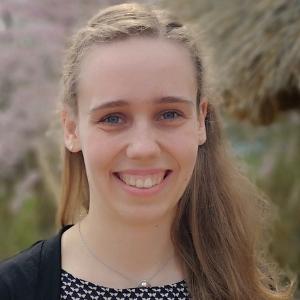
Dr. Elena Hoemann, Faculty of Physics, has been granted a doctoral award by the Munich University Society (MUG) for her dissertation, “Merging, fragmentation and collapse of interstellar filaments.”
The star formation process plays a key role in the development of galaxies, the synthesis of chemical elements, and planetary formation, including the question of the emergence of life. Involving many complex, partially interconnected phenomena, the process is not yet sufficiently understood. In her dissertation, Elena Hoemann modeled the formation of stars in dense, cold molecular gas clouds. Employing numerical simulations and analytical calculations, she discovered the answer to a previously unsolved problem: According to the prevailing theoretical models, stars should form predominantly at the ends of cold molecular filaments. Hoemann demonstrated that the gas filaments should not be observed in isolation in simulations, but as part of an interacting galactic filament network. Her simulation results agree well with observations. The large-scale interaction of filaments could even influence the formation of protoplanetary disks.
Dr. Elena Hoemann currently works at the German Aerospace Center Institute for AI Safety and Security in Sankt Augustin.

Munich University Society (MUG) has granted Dr. Julia Hugo, Faculty of Psychology and Educational Sciences, a doctoral award for her dissertation, “Teacher professionalization at the interface of legal and educational science.”
In her dissertation, Julia Hugo demonstrates the importance of legal issues and topics for education in schools, teaching and pedagogical discourse, opening up legal-oriented research as a key field of educational science. Although neglected in recent decades, this branch of research has eminent pedagogical value. On a theoretical level Hugo links pedagogical theory with law doctrine, while at a research level she is pioneering the systematization of legal topics within the pedagogical discourse and making legal objects of investigation (legal texts, case law etc.) amenable to pedagogical inquiries. With the development of a specific method for case law review, the dissertation breaks new ground in creating suitable methodology for this purpose. Teachers, their work, and their professionalization represent the focal point of her analysis. If we are to have a discourse about the professionalization of teachers that does justice to the specifics of the subject, summarizes Julia Hugo, we urgently need to incorporate legal categories and approaches. In particular, it is important not only to highlight legal boundaries, but also to reflect on the legal leeway within them.
Dr. Julia Hugo currently works as a research associate at the Department of School Pedagogy with a focus on Educational Governance and Educational Change at Friedrich-Alexander-Universität Erlangen-Nuremberg.
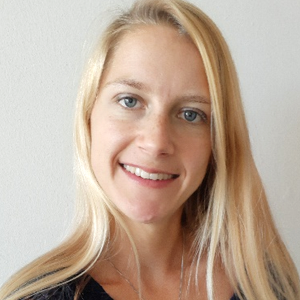
Dr. Sabrina Keil, Faculty of Earth and Environmental Sciences, has been granted an MUG doctoral award for her dissertation, “Evaluation of Ground Motion and Optimum Seismic Monitoring at an Inner-City Deep Geothermal Power Plant.”
In her dissertation, Sabrina Keil applied a new measuring technique for the first time to the risk analysis of geothermally induced earthquakes in the Munich area. These 6-component (6C) data not only capture the classical translational motions of seismic waves, but also their rotational motions. With her dissertation, Sabrina Keil has broken new methodological and scientific ground. Using numerous measurements, which she analyzed with machine learning methods, Keil generated underground seismic velocity models. The new method has great potential beyond geothermal applications and could be used in fields such as planetary seismology, vulcanology, and ocean-bottom seismometry.
Dr. Sabrina Keil currently works as a postdoc in the NEPOS project, a collaboration between LMU, TUM and DLR to study the near-surface structure of the moon. Additionally, she is completing a research stay at the Geosciences Institute in Barcelona (CSIC).
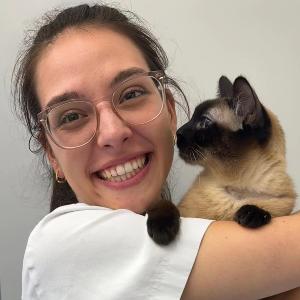
Dr. Daniela Krentz, Faculty of Veterinary Medicine, has been granted a doctoral award by the Munich University Society (MUG) for her dissertation, “Effectiveness of Orally Administered GS-441524 for the Treatment of Cats with Feline Infectious Peritonitis (FIP).”
Feline infectious peritonitis (FIP) is a viral infectious disease caused by mutations of the feline coronavirus. Until recently, the disease was considered fatal for cats. New antiviral drugs have offered hope, but have not yet been approved. In her dissertation, Daniela Krentz investigated the effectiveness on cats with FIP of an antiviral active agent that can be administered in tablet form (GS-441524) – the first time worldwide this possibility has been studied. Her research demonstrated that the drug is highly effective: All cats treated with the drug were cured and survived the infection. These results represent an important breakthrough in veterinary medicine and show that FIP does not have to be a death sentence for cats any longer.
Dr. Daniela Krentz currently works as a research associate at the Clinic of Small Animal Medicine at LMU Munich.
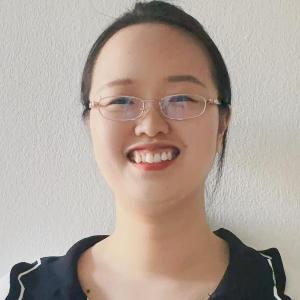
Dr. Wei Li, Faculty of Veterinary Medicine, has received a PhD award from the Munich University Society (MUG) for her dissertation, “Characterisation of two essential proteins for host cell egress and invasion identified by phenotypic screening in Toxoplasma gondii."
Toxoplasmosis is one of the most common zoonoses worldwide. People can catch the infection from cats, for example, or from consuming undercooked meat. The disease is particularly dangerous for pregnant women, as it can lead to fetal malformations. It is triggered by the parasite Toxoplasma gondii, which invades the cells of its host and multiplies there.
In her dissertation, Wei Li investigated how the pathogen gets out of its host cell after multiplying. As it was not known which genes code for the proteins involved, a novel genetic screening technique was developed to identify them. Using this method, which is based on the CRISPR/Cas9 “genetic scissors,” she discovered two genes without which cell egress is impossible. Targeted destruction of these genes led to a blockade of the egress and thus to the death of the next parasite generation inside the host cell. This potentially clears the way for the development of active agents that could block the function of the corresponding proteins and thus stop them propagating.
Wei Li works as a postdoctoral researcher in the Experimental Parasitology department at LMU’s Faculty of Veterinary Medicine.
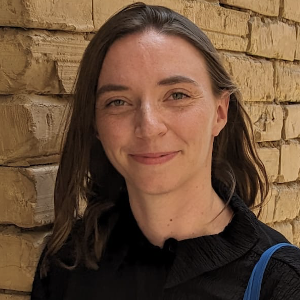
Dr. Poppy Tushingham, Faculty of History and the Arts, Historical Seminar, has received a Munich University Society (MUG) doctoral award for her dissertation, “Creating an empire of informers. Vigilance in the Assyrian Empire after King Esarhaddon’s adê-covenant of 672 BC.”
How did the rulers of former empires convince their people to monitor themselves and others in the interests of the state? In her dissertation, Poppy Tushingham approaches this question from an unusual perspective – that of the subjects. Using this bottom-up approach, she studies the Assyrian Empire, situated in modern-day Iraq, investigating in a case study how the ruler King Esarhaddon sought to motivate his subjects to be vigilant in the name of the king and his chosen successor and to monitor others. Tushingham focuses on one tactic in particular – i.e. imposing a covenant on the empire’s subjects, making them swear loyalty to the crown and promise to report on their fellow subjects. On the basis of textual sources, she was also able to delve into the success and failure of this measure. The dissertation is a detailed case study of the control and monitoring efforts of an early empire.
Dr. Poppy Tushingham works as an assistant professor (Akademische Rätin auf Zeit) at the Chair of Ancient History of the Near and Middle East.

University Society (MUG) has given PD Dr. Martin Gross, Faculty of Social Sciences, a habilitation award for his thesis, “Dynamic party competition in European multi-level systems.”
The European elections have shown once again how the party landscape of the continent is being reshaped: populist parties are growing in strength and some newly founded groupings have had big success at the polls. This severely tests the adaptability of the established political forces. Political scientist Martin Gross has compared how European parties and their representatives are behaving in elections and parliaments at the various political levels. What policy priorities do they lay out in their election programs and coalition agreements? How do they respond to external challenges such as the global financial and economic crisis? The cumulative habilitation thesis of Martin Gross is comprised of eleven essays, all of which were published in the foremost international journals of comparative politics and which deepen our understanding of the rapidly changing party landscape.
PD Dr. Martin Gross is associate professor (Akademischer Rat auf Lebenszeit) at the Chair of Political Systems and European Integration at LMU’s Geschwister Scholl Institute of Political Science.
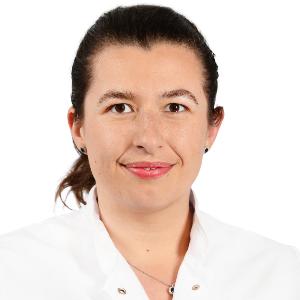
PD Dr. Christina Scharf-Janßen, Faculty of Medicine, has received a habilitation award from Munich University Society (MUG) for her thesis on the benefits and challenges of routine therapeutic drug monitoring of antibiotics for intensive care patients.
Despite the various options available to modern intensive care medicine, treating septic shock remains a big challenge and many people still die from this condition every year. To prevent this, or at least decrease the risk of death, it is critical that patients are punctually given a suitable dose of an effective antibiotic. In the case of seriously ill patients in particular, choosing an optimal dosage is extremely complex. If a dose is too low or too high, with a concentration of active agents in the blood that is too low or too high, it can hamper the success of the treatment. In her habilitation thesis, Christina Scharf-Janßen investigated whether routine therapeutic drug monitoring helps with the dosage of antibiotics and how it can be improved. To this end, she developed – in the framework of prospective clinical studies – innovations such as a pragmatic dosing algorithm for intensive care patients undergoing intermittent renal replacement therapy and a pharmacokinetic model for the dosing of vancomycin during the use of a cytokine adsorber. Her research has the potential in future to help save the lives of people suffering from sepsis.
Christina Scharf-Janßen is a specialist in anesthesiology and intensive care medicine who works as a senior physician (Oberärztin) in the anesthesiological intensive care units at LMU University Hospital.